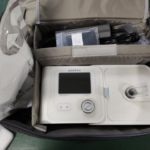What is the best way to use non-invasive ventilators to fight coronavirus?
Saving lives and preventing the collapse of intensive care units (ICUs). That is the priority for Spanish hospitals (and those around the world) during the peak of the COVID-19 pandemic. A recent report by the Gregorio Marañón University Hospital in Madrid, which analyzed one of the non-invasive ventilators from China (Yuwell 730), concludes that “its use is expected to delay or even prevent the need to transfer patients to the ICU, and therefore help to relieve their saturation.”

The Experimental Medicine and Surgery Unit at the Gregorio Marañón University Hospital in Madrid (led by the Doctor Manuel Desco, Professor at the Carlos III University of Madrid) carried out this analysis at its test site. A study that could be very useful for hospitals across Spain where the 1,000 non-invasive ventilators donated by BBVA were distributed. The research was conducted on several units of the first equipment to reach Spain, and the updated information on them is available on this site.
“A few units were subject to testing at the Gregorio Marañón Hospital last week to assess whether they are adequate for use with severe coronavirus patients and thus help reduce congestion levels at ICUs. The result of the assessment has already been shared with the other hospitals among which we have distributed the equipment”, has explained Ricardo Forcano, global head Engineering and Operation BBVA. “We will continue to distribute more medical supplies and equipment in the coming weeks, as part of BBVA’s global commitment to donate €35 million to fight the coronavirus”, has said.
Since Sunday, March 29 (the date when the first set of equipment reached the hospital) and through Saturday, April 4 (date when the initial study was concluded) this unit and the Pneumology Service at the same hospital have worked to determine the optimal use of this equipment to manage the COVID-19 crisis. They also received support from BBVA to obtain parts (for example, connectors printed in 3D in collaboration with Accenture) and sensors (like the oximeter lent by the University Hospital of Getafe), as well as direct communication with technicians from the Yuwell manufacturer in Nanjing (China) via Skype and the support of a group of collaborators from Respiradores4all.
“As a result of these collaborative efforts,” the report explains, “the Gregorio Marañón University Hospital has managed to characterize this equipment for a use, foreseen by the manufacturer and without the need for any additional parts, which makes it possible to supply an oxygen-rich mixture to meet patients’ oxygen and pressure needs, instead of pressurized air.”
Thus, in the following cases, this bi-level positive airway pressure (biPAP) respiratory support equipment “could be used in the fight against COVID-19 if decided to do so in the hospitals where the equipment is distributed”:
- Patients whose condition is deteriorating and who are likely to be admitted to the ICU, thus delaying or even avoiding the need to admit them to the ICU.
- ICU patients who are not doing too badly and in support mode, or patients in the ‘weaning’ process (removing the conventional invasive ventilator) to make the conventional ventilator available for other patients more quickly.

Source: Report "Use of Yuwell 730 equipment in COVID-29 Patients." Department of Experimental Medicine and Surgery at the Hospital General Universitario Gregorio Marañon in Madrid.
The information provided by the experts in China indicates that 7,000 of these units were used there during the peak of the epidemic in Wuhan, and some of them were used for invasive ventilation in emergency situations.
Mechanical ventilation is a life support technique that makes it possible to maintain respiratory function while other medical treatment is applied. There are two types of mechanical ventilation:
- Non-invasive ventilation. This is a ventilatory support procedure that does not require tracheal intubation, and is used in patients who do not yet need to be admitted to the ICU. It can also be used in patients who have surpassed the toughest stages of the disease in the ICU and are able to leave this unit. This ventilation complements the patient’s respiratory capacity with a mask. It can be used to treat acute and chronic respiratory failure and does not require deep anesthesia, so the patient can communicate, eat, drink and expectorate.
- Invasive ventilation. It is called this way because it is based on the insertion of an endotracheal tube. It is a ventilatory support measure that is used in severe cases, when lung damage makes proper oxygenation impossible. Its use may be required for many reasons, including the loss of a substance that makes it easier to move the rib cage (respiratory distress) and which can be caused by fluid entering the alveolar space. The respiratory effort becomes excessive for the patient and oxygen levels drop, so the patient needs to enter the ICU, where a mechanical ventilator is used to push humidified air into the lungs. In many cases, it requires deep sedation so that the patient’s breathing can be completely regulated by the machine.

One of the one thousand non-invasive Yuwell 730 ventilators donated by BBVA and currently distributed to hospitals across Spain.
According to Doctors Without Borders, around 80 percent of those infected with COVID-19 will experience a mild or moderate form of the disease and do not require hospitalization. Fifteen percent will need to be hospitalized, and around five percent will develop severe symptoms that require ICU services. In summary, 15 out of every 100 people with the virus will require hospital beds and approximately five will need to be admitted to the ICU. The use of ventilators (mechanical ventilation devices) both in the ICU and outside of the ICU is crucial to save the lives of patients whose lungs have been affected by the virus, as these machines give the patient time to fight the infection and recover.
BBVA donated 1,000 biPAP units of the Yuwell 730 model mentioned in the report in Spain, and it plans to donate another 1,000 units in Mexico in the next few days. In Spain, the first 260 units arrived in Barcelona on Saturday, March 28th and the remaining 740 reached Zaragoza on Tuesday, March 31st. They were all delivered by the bank to regional healthcare services according to the plan defined by the Spanish Ministry of Health. In addition, the bank donated and delivered 13 more invasive respirators for ICUs (Getinge Servo model) to different hospitals around the country.
In the next few days, a third shipment of 400,000 masks will reach Spain. More invasive ventilators are also pending shipment, which the bank will donate to Spanish healthcare authorities for the fight against the pandemic.
BBVA has announced that it will donate €35 million, primarily for the purchase and donation of medical equipment and for social organizations’ programs and initiatives in the different countries where it operates to combat coronavirus.